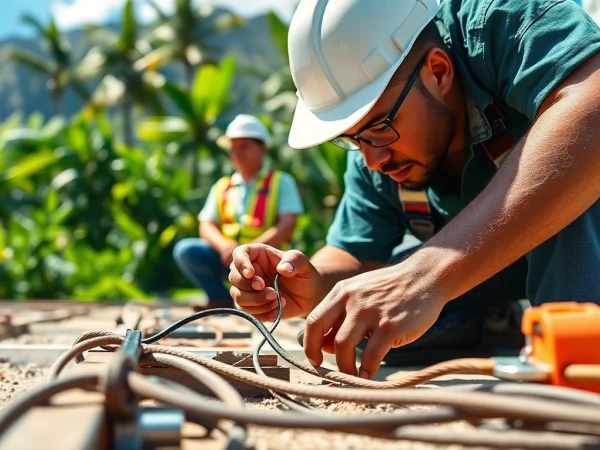How to Start Your Electrician Apprenticeship in Hawaii: A Complete Guide
Understanding the Electrician Apprenticeship in Hawaii
What is an Electrician Apprenticeship?
An electrician apprenticeship is a structured training program that combines on-the-job experience with classroom instruction. In Hawaii, these apprenticeships typically last from 4 to 5 years and prepare individuals for a rewarding career in the electrical trade. During this period, apprentices work under the supervision of licensed electricians, gaining hands-on experience while learning essential theoretical knowledge, electrical codes, safety practices, and technical skills. The program is designed to equip aspiring electricians with the skills necessary to perform installations, maintenance, and repairs of electrical systems in residential, commercial, and industrial settings.
Importance of Electrician Apprenticeships in Hawaii
The importance of electrician apprenticeships in Hawaii cannot be overstated. The state’s unique geographic and environmental challenges create a compelling demand for skilled electricians who can navigate complex electrical projects while adhering to safety standards. Given Hawaii’s high cost of living and a growing focus on renewable energy, electricians play a crucial role in developing sustainable practices in construction and maintenance. Moreover, apprenticeships offer direct pathways to licensure, ensuring that new electricians meet regulatory requirements and have the essential skills to thrive in the industry.
Eligibility Requirements for Electrician Apprenticeship
To qualify for an electrician apprenticeship in Hawaii, candidates typically must meet certain eligibility criteria, including:
- Be at least 18 years old.
- Possess a high school diploma or equivalent (GED).
- Have a valid driver’s license.
- Pass a drug test and background check.
- Complete any mandatory pre-apprenticeship training, if required.
Meeting these eligibility requirements is crucial for candidates to successfully enroll in any electrician apprenticeship program.
Applying for Electrician Apprenticeships in Hawaii
Steps to Apply for an Electrician Apprenticeship
The process of applying for electrician apprenticeships can be straightforward if approached systematically. Here are the steps you should follow:
- Research Programs: Begin by researching various apprenticeship programs available in Hawaii. The Hawaii Electricians Training Fund is a popular option and provides detailed information on their offerings. You can visit their site for more details on electrician apprenticeship hawaii.
- Gather Required Documents: Prepare necessary documents such as a resume, educational certificates, and identification papers. This will help streamline your application process.
- Complete the Application: Fill out application forms for different programs, paying attention to specific requirements for each. Ensure that all information is correct and complete.
- Prepare for Interviews: Some programs may require an interview as part of the selection process. Prepare yourself by researching common interview questions related to the electrical field.
- Follow Up: After submitting applications, follow up with the organizations to express your continued interest and inquire about the status of your application.
Choosing the Right Electrician Training Program
Selecting the right electrician training program is critical to your success as an apprentice. Consider the following factors:
- Accreditation: Ensure that the program is accredited by recognized organizations. This will ensure the quality of training and increase your credentials in the job market.
- Curriculum: Review the curriculum to see if it meets your learning goals. Look for programs offering a good balance between classroom instruction and hands-on training.
- Mentorship Opportunities: Programs that provide mentorship from experienced electricians can greatly benefit your learning experience.
- Job Placement Rates: Research job placement rates of past graduates to gauge the effectiveness of the program in helping apprentices find employment post-training.
Preparing for the Application Process
Preparation is key to a successful application for an electrician apprenticeship. Here are tips to help you get ready:
- Networking: Connect with current electricians or instructors, especially those affiliated with the program you are applying to. They can provide insights and guidance.
- Study Relevant Subjects: Brush up on math, physics, and electrical theory, as these subjects are crucial for any apprenticeship and will help you in interviews and assessments.
- Gain Experience: If possible, seek out volunteer opportunities or entry-level positions in related fields such as construction or maintenance to gain foundational skills.
What to Expect During Your Apprenticeship
Training Components of Electrician Apprenticeships
As an electrician apprentice, you will undergo various training components that encompass both theoretical knowledge and practical skills:
- Theoretical Training: Apprentices typically spend a certain number of hours in the classroom, where they learn about electrical theory, codes, safety protocols, and installation techniques.
- Practical Experience: Hands-on training occurs on job sites under the guidance of licensed electricians. This includes installation, troubleshooting, and maintenance of electrical systems.
- Workshops and Seminars: Many programs include additional workshops, seminars, and certifications that enrich learning and expose apprentices to new trends and technologies in the electrical industry.
Hands-on Experience vs. Class Training
A significant benefit of an electrician apprenticeship is the combination of hands-on experience and classroom training:
While classroom training provides foundational knowledge, hands-on experience allows apprentices to apply what they’ve learned in real-world scenarios. This practical approach ensures that apprentices not only grasp theoretical concepts but also develop problem-solving skills critical when faced with unexpected challenges during installations or repairs.
Mentorship Opportunities in Hawaii
Mentorship plays a vital role in ensuring the success of apprentices in Hawaii. Through mentorship, aspiring electricians can:
- Receive Guidance: Experienced electricians provide guidance, helping apprentices navigate the complexities of the electrical field.
- Build Professional Networks: Mentors often introduce apprentices to other professionals in the industry, broadening their career prospects.
- Enhance Learning: Mentoring can lead to enhanced retention of knowledge, as apprentices can learn directly from professionals with years of hands-on experience.
Career Opportunities After Completing Your Apprenticeship
Advancing Your Career as a Licensed Electrician
Upon successful completion of an apprenticeship, individuals typically need to pass a licensing exam to become licensed electricians. Advancing to a licensed status opens up numerous opportunities, including:
- Higher Earning Potential: Licensed electricians generally enjoy better salaries compared to apprentices, reflecting their expertise and professional status.
- Specialization Options: After becoming licensed, electricians can choose to specialize in areas such as renewable energy systems, automation, or industrial electrical work.
- Management Roles: Licensed electricians may have opportunities to take on supervisory or management roles within their organizations, overseeing projects and mentoring new apprentices.
Job Prospects for Electricians in Hawaii
The job prospects for electricians in Hawaii are promising, with a growing demand driven by ongoing construction projects, infrastructure upgrades, and a pivot toward renewable energy. Factors contributing to the outlook include:
- Population Growth: Increasing population and tourism in Hawaii necessitate the development of new residential and commercial properties.
- Renewable Energy Initiatives: The state’s commitment to renewable energy sources calls for more electricians skilled in solar energy installations and maintenance.
- Infrastructure Projects: Investments in upgrading the electrical grid and public infrastructure lead to increased demand for skilled labor.
Networking in the Electrician Community
Networking is a critical component for advancing your career as an electrician in Hawaii. Engaging with local trade organizations, attending job fairs, and participating in community workshops enhances your visibility and connections within the industry. Joining professional organizations such as the IBEW (International Brotherhood of Electrical Workers) can provide additional resources for continuing education, job placement, and professional development opportunities.
Resources for Electrician Apprentices in Hawaii
Local Organizations and Support Systems
Several organizations and support systems are available for electrician apprentices in Hawaii, providing resources, training, and networking opportunities. Some of the notable ones include:
- Hawaii Electricians Training Fund: Offers various training programs and resources to help aspiring electricians.
- IBEW Local 1186: Advocates for electricians’ rights and provides access to training and job placement support.
- Hawaiian Electric: Supports technical education initiatives and offers opportunities for internships and mentorships.
Online Resources and Job Boards
In addition to local resources, apprentices can leverage online resources and job boards to maximize their opportunities. Websites like Indeed, LinkedIn, and trade-specific forums provide rich resources for job listings, networking, and gaining insights into industry trends. Staying updated through these platforms ensures that apprentices remain aware of emerging job opportunities and job market demands.
Tips for Success as an Electrician Apprentice
Here are several actionable tips to help ensure success during your electrician apprenticeship:
- Stay Committed: Dedicating yourself fully to the apprenticeship will enhance your learning and skills acquisition.
- Be Proactive: Seek out additional responsibilities or ask questions to deepen your understanding of electrical systems.
- Prioritize Safety: Always adhere to safety protocols and regulations to protect yourself and those around you.
- Maintain Open Communication: Foster a good relationship with your mentor and co-workers, as open lines of communication can facilitate better learning.



